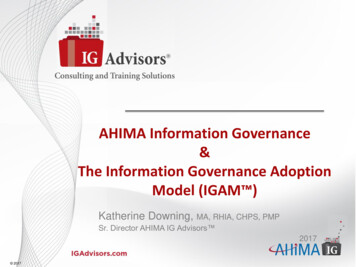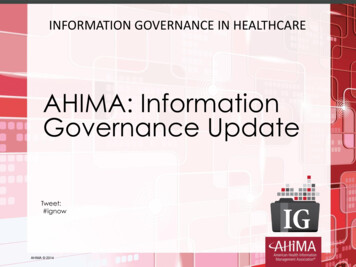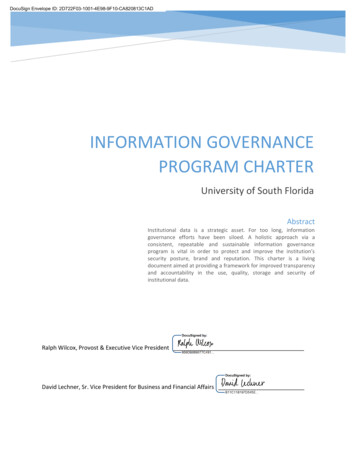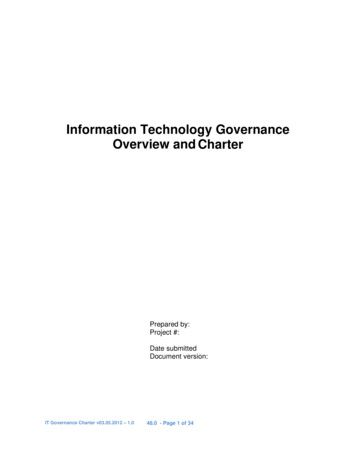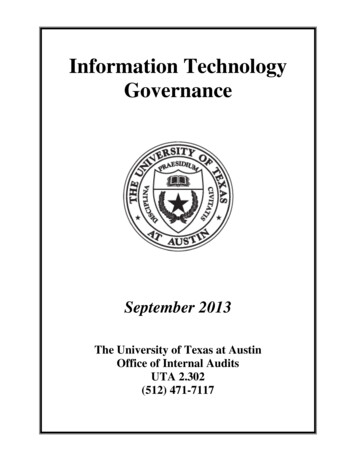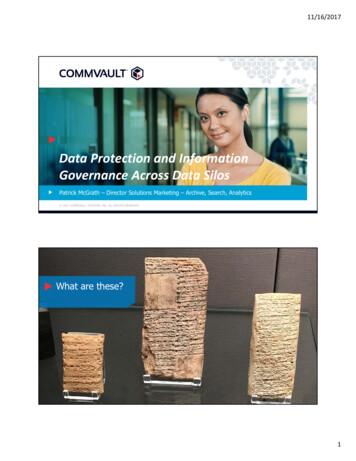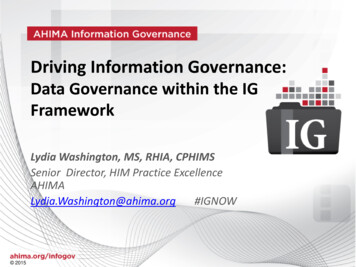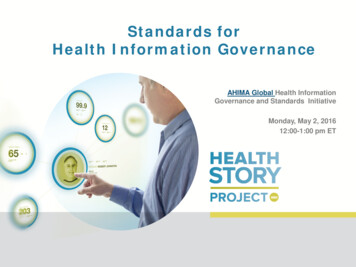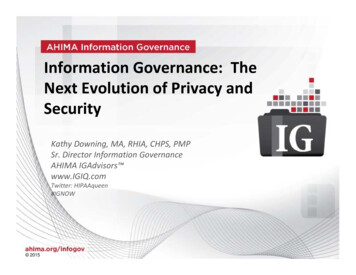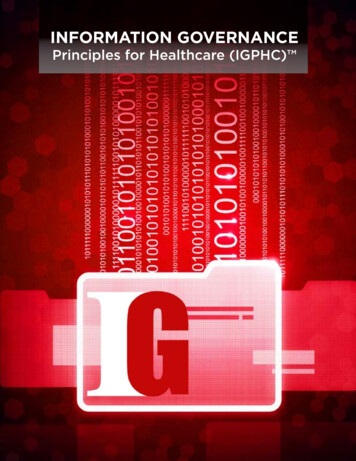
Transcription
Information Governance Principles for Healthcare (IGPHC) INFORMATION GOVERNANCEPrinciples for Healthcare (IGPHC) AHIMA3
Information Governance Principles for Healthcare (IGPHC) INFORMATION GOVERNANCEPrinciples for Healthcare (IGPHC) Preamble.3Principle of Accountability.5Principle of Transparency.6Principle of Integrity.7Principle of Protection.9Principle of Compliance. 10Principle of Availability. 11Principle of Retention. 12Principle of Disposition. 14IGPHC Glossary of Selected Terms. 15Acknowledgements. 19 2014 by the American Health Information Management Association1
Information Governance Principles for Healthcare (IGPHC) PREAMBLEComplete, current, and accurate information is essential for any organization in the healthcareindustry to achieve its goals. Adoption of an information governance program underscores theorganization’s commitment to managing its information as a valued strategic asset. Governanceof clinical and operational information: Improves quality of care and patient safety Improves population health Increases operational efficiency and effectiveness Reduces costs Reduces riskInformation governance helps manage and control information by supporting the organization’sactivities and ensuring compliance with its duties. Drawing from definitions of Gartner andARMA International, AHIMA defines information governance as an organization-wide frameworkfor managing information throughout its lifecycle and supporting the organization’s strategy,operations, regulatory, legal, risk, and environmental requirements.Information governance establishes policy, prioritizes investments, values and protects information assets, and determines accountabilities for managing information, making it an imperative forhealthcare. It also promotes objectivity through robust, repeatable processes insulated from individual, organizational, political, or other biases, and then protects information with suitable controls.By following information governance principles, organizations conduct their operations effectively,while ensuring compliance with legal requirements and other duties and responsibilities.Healthcare as a Unique Information EnvironmentTrust plays a critical role in healthcare delivery. Patients entrust their personal information tohealthcare organizations, creating distinct requirements for confidentiality, privacy, and security.These organizations, regardless of their roles in healthcare, must earn the confidence of patients andsociety, through a firm commitment to ethical and responsible handling of personal information.Embedded in trust is the expectation of information integrity, which depends on the completenessand correctness of data. Heightened focus on integrity to ensure confidence in information isdemanded by the nature of healthcare, changes in care delivery and payment models, the increasingadoption of electronic systems, and the importance of reliable information exchange.Healthcare organizations have an obligation to defineuses of information and to define the policies andpractices for governing use of the information.This includes protected health information,personally identifiable information, de-identifiedand anonymized information, aggregate and detailedinformation used to satisfy mandatory or voluntaryreporting purposes, operational needs, secondaryuses of data/information, and other uses based onthe role and mission of the organization.rust plays a critical role in healthcare“ Tdelivery.Patients entrust their personalinformation to healthcare organizations,creating distinct requirements forconfidentiality, privacy, and security.These organizations, regardless oftheir roles in healthcare, must earnthe confidence of patients and society,through a firm commitment to ethicaland responsible handling of personalinformation.Research is fundamental to advancing the scienceof medicine. New guidelines, protocols, treatments,interventions and wellness insights, all developedthrough research, are essential to elevating population health. Research, whether focused on clinicalcare, delivery systems, or payment models, depends on trusted information.”2AHIMA
Information Governance Principles for Healthcare (IGPHC) Healthcare organizations must value and govern notonly their clinical, but their nonclinical information,such as human resources, operational, financial, legal,and marketing information. Reliable information isessential to reducing healthcare delivery costs andimproving operational efficiencies. For these reasons,establishing and implementing principles for thegovernance of clinical and nonclinical information,in all formats and on all media, increases in significance.he adherence to information and“ Ttechnologystandards across healthcareis compelled, as standards are crucialto information use and exchange giventhe imperatives of integrity, securityand interoperability.”The healthcare ecosystem consists of a variety of organizations and stakeholders, who share common goals.These organizations encompass healthcare providers, as well as nonproviders. Providers include all types andsettings of healthcare service organizations. Nonproviders include organizations such as information exchanges,health plans, third party administrators, data clearinghouses, and other information intensive organizations.Indeed, an organization’s entire workforce, including employed and contracted individuals, and where applicableall members of its nonemployed medical and professional staffs, are accountable for the responsible and ethicalhandling of information. The responsibility for practicing in accordance with organization’s governance policiesand procedures extends to outsourced services and their workforces, as well as to business partners and affiliateswho use information or handle any aspect of information management for the organization.Challenges facing the healthcare industry include: Expanding numbers of electronic systems/applications in use within and across organizations, Growing volume and variety of data and information, Expanding uses of healthcare information, Proliferation of medical devices creating data for which reliable integration intosystems/applications is essential, State of interoperability across devices and systems, and Reliability of shared and exchanged information.These challenges and complexities underscore the need for information governance, and the need for theirdue consideration in its adoption. The adherence to information and technology standards across healthcareis compelled, as standards are crucial to information use and exchange given the imperatives of integrity,security and interoperability. Despite the diversity in the healthcare industry, information across the various types of organizations can begoverned using eight principles: accountability, transparency, integrity, protection, compliance, availability,retention, and disposition. These principles can be adopted in any organization within the healthcare industry.Information Governance Principles for HealthcareThe principles of information governance, known as the Information Governance Principles for Healthcare(IGPHC) , are comprehensive and written broadly. They do not set forth a legal rule for which strict adherenceis required by every organization in every circumstance, but are intended to be interpreted and applied dependingupon an organization’s type, size, role, mission, sophistication, legal environment, and resources.The IGPHC are based on practical experience, information theory, and legal doctrine within healthcare andfurther informed by other established practices and tenets from areas such as quality improvement, safety, riskmanagement, compliance, data governance, information technology governance, privacy, and security.They are grounded in several common, yet essential, values embedded in healthcare—accuracy, timeliness,accessibility, and integrity. These values serve the best interests of the healthcare information consumer, fromproviders to nonproviders, from researchers to public health officials, from information exchanges topolicymakers, from claims administrators to payers, and from patients to society.AHIMA3
Information Governance Principles for Healthcare (IGPHC) AHIMA has convened healthcare industry stakeholders and leaders, as well as information governanceexperts from other industries to articulate the IGPHC through adaptation of ARMA International’sGenerally Accepted Recordkeeping Principles. Based on the general principles which apply to allindustries, the IGPHC are specifically aimed at healthcare industry organizations. Therefore, theIGPHC apply not only to the governance of healthcare information, but also to the governance ofinformation across all functions of organizations in the healthcare industry.The adoption of these principles by an organization reflects a dedication to strengthen its informationgovernance, and increase its effectiveness for the benefit of its patients, stakeholders, and society.These principles form the basis upon which every effective information governance program is built,measured, and eventually judged.Therefore, it is in the best interest of patients, other consumers, society, and all organizations inthe healthcare ecosystem, that there is full awareness of the Information Governance Principles forHealthcare (IGPHC) and that information assets be managed in accordance with them.PPRINCIPLE OF ACCOUNTABILITYAn accountable member of senior leadership, or a person of comparable authority, shall oversee theinformation governance program and delegate program responsibility for information managementto appropriate individuals.The governing body of the organization is ultimately accountable for the adoption of informationgovernance practices and should require regular reporting by the designated member of seniorleadership. The organization should adopt policies and procedures to guide its workforce and agentsand ensure its program can be audited and continually improved to support the organization’s goals.An information governance program should: Establish an information governance structure for program development and implementation Designate a qualified accountable person to develop and implement the program Document and approve policies and procedures to guide its implementation Remediate identified issues Enable auditing as a means of demonstrating the organization is meeting its obligationsto both internal and external partiesA basic premise of sound information governance is that within each organization a senior leaderis formally designated as responsible for the overall program development and its implementation.The senior leader is accountable for ensuring the information governance program aligns with andsupports the goals and strategies of the organization. The senior leader is also accountable for ensuringappropriate resources are allocated to support the program.Governance should be established throughout the organization, utilizing a collaborative approach,with input of stakeholders, business process owners, and domain experts, assigning defined roles andresponsibilities to workforce members. It should be clear where responsibilities reside and how thechain of command builds, implements, and updates the information governance program. For example,sub-committees can be designated to help build policies, define and implement technology, or improvethe information governance program.should be established throughout the organization, utilizing“ Governancea collaborative approach, with input of stakeholders, business processowners and domain experts, assigning defined roles and responsibilitiesto workforce members.”4AHIMA
Information Governance Principles for Healthcare (IGPHC) To assist the workforce in understanding how to implement information governance practices, it isessential that policies and procedures are documented, formally approved, and communicated. Theworkforce should be continuously trained in program policies and any relevant updates to standardizeinformation governance practices across the organization and to reinforce compliance with andstandardization of practices.A senior leader at an appropriate level of authority shall oversee program compliance monitoring/auditand improvement. Audits should be performed to determine the following: The workforce demonstrates program awareness The workforce is trained in information governance practices, policies, and responsibilities Information is appropriately protected, accessed, stored, and released with a properlydocumented audit trail Information is available when and where it is needed Information is retained for the right amount of time and properly dispositioned whenno longer required Policies are up-to-date, adopted, and cover all types of information in all mediaAn organization’s information governance audit should be reported to its board of directors, trustees,audit committee, or other appropriate governing body, committee, or individual to show adherencein accordance with its program requirements and the organization’s goals.PPRINCIPLE OF TRANSPARENCYAn organization’s processes and activities relating toinformation governance shall be documented in an openand verifiable manner. Documentation shall be availableto the organization’s workforce and other appropriateinterested parties within any legal or regulatory limitations,and consistent with the organization’s business needs.clearest and most durable“ Theevidence of the organization’soperations, decisions, activities,and performance are its recordsand information.”Transparency of the organization’s governance practices must extend to definitions of appropriateinformation uses and the processes for ensuring compliance with policies on appropriate information use.The clearest and most durable evidence of the organization’s operations, decisions, activities, andperformance are its records and information. An information governance program includes itsinformation management and information control policies and procedures. To ensure the confidenceof interested parties, records documenting the information governance program must themselvesadhere to the fundamentals of information management. These records should: Document the principles and processes that govern the program Accurately and completely record the activities undertaken to implement the program Be available to legitimately interested parties in a timely and reasonable manner The information documented in these records and the extent to which they are available to interestedparties will vary depending upon the nature and circumstances of the organization. For example,healthcare organizations have a legitimate need to protect confidential and proprietary information.Therefore, procedures shall be put in place to control access to protected information, whether it relatesto the confidentiality of information or the confidentiality of proprietary processes.Various parties have a legitimate interest in understanding the information governance programactivities and processes. In addition to the organization itself and its workforce, those parties include, butare not limited to, patients and consumers, government authorities, auditors and investigators, litigants,and for some organizations, the general public.AHIMA5
Information Governance Principles for Healthcare (IGPHC) Complex and highly regulated records and information management systems may require extensiverecords documenting their governance. Simple systems may require only a few. In each case, however,the rationale and results should be clear to legitimately interested parties.Each organization must therefore create and manage the records documenting its informationgovernance program to ensure its structure, processes, and practices are apparent, understandable,and reasonably available to legitimately interested parties.PPRINCIPLE OF INTEGRITYAn information governance program shall be constructed so the information generated by,managed for, and provided to the organization has a reasonable and suitable guarantee ofauthenticity and reliability.Integrity of information, which is expected by patients, consumers, stakeholders, and other interestedparties such as investors and regulatory agencies, is directly related to the organization’s ability toprove that information is authentic, timely, accurate, and complete. For the healthcare industry, thesedimensions of integrity are essential to ensuring trust in information.For safety, quality of care, and compliance with applicable voluntary, regulatory and legalrequirements, integrity of information should include at least the following considerations: Adherence to the organization’s policies and procedures Appropriate workforce training on information management and governance Reliability of information Admissibility of records for litigation purposesInformation governance incorporates Acceptable audit trailsthe governance of data. As data arethe building blocks of information, Reliability of systems that control informationinformation cannot be reliable if theInformation from External Sourcesdata are not reliable.It is critical that organizations determine theirresponsibilities and processes for classifying andmanaging information received from other sources.“ ”A healthcare organization’s information may contain patient or other business information thatoriginated from another healthcare organization. For example, copies of selected patient reports areoften sent by one healthcare provider to another where a patient is admitted. Information received fromthe previous provider is then incorporated into the patient’s health record at the receiving organization.Organizations must comply with re-disclosure responsibilities under all relevant laws.Information Governance Policies and ProceduresAdherence to information governance policies and procedures that have been approved by seniormanagement is essential to an organization’s ability to achieve legal and regulatory compliance, as wellas consistently carrying out information governance practices. If adherence to policies and proceduresis not substantiated, records may be at risk of not being accepted as having evidentiary value.Appropriate Training on Information Management and GovernanceThe organization shall provide training to all workforce members, and outsourced or contracted individuals when appropriate, on the meaning and importance of compliance with its policies and procedures.6AHIMA
Information Governance Principles for Healthcare (IGPHC) of information, which is expected by patients, consumers,“ Integritystakeholders and other interested parties such as investors, and regulatoryagencies, is directly related to the organization’s ability to prove thatinformation is authentic, timely, accurate, and complete.”Reliability of InformationOrganizations should define and apply consistent information governance practices throughout theinformation lifecycle. This helps ensure informa
Information Governance Principles for Healthcare (IGPHC) 2 AHIMA PREAMBLE Complete, current, and accurate information is essential for any organization in the healthcare industry to achieve its goals. Adoption of an information governance program underscores the organization’s commitment to managing its
